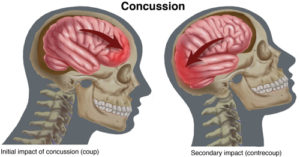CONCUSSIONS – THE INVISIBLE INJURY
Concussion is a mild traumatic brain injury (mTBI) that can damage brain tissue and change the chemical balance of the brain.
Concussion may cause physical, mental and emotional symptoms and problems, both short term and long term.
Every concussion is considered a serious injury by health care providers.
Causes of concussions
Car accidents (head impact, or whiplash)
Work accidents (falls, head trauma)
Playground accidents (falling from a slide or swing)
Sport injury to the head or neck
Any type of fall or direct blow to the head, face or neck
Violent events (physical abuse which the head is shaken, being too close to an explosion)
Signs & Symptoms of Concussion
Headache
Nausea
Dizziness
Light Sensitivity
Confusion
‘Black out’
Ringing in the ears
Neck Pain
Fatigue
Moodiness and anxiety
Difficulty sleeping
‘Foggy mind’
Poor balance
Depression
Slow reaction times
Slurred speech
Seizures
Glassy-eyed stare
Decreased tolerance of stress
Difficulty concentrating
Change in behaviour
Low blood pressure
Weight gain
Difficulty remembering
How is a Concussion Diagnosed?
Concussions are diagnosed through careful testing by health care providers. Physiotherapists will ask many questions to understand all the symptoms being experienced, and perform a number of tests to identify problems caused by the concussion, which may include strength, coordination, balance, sight, smell, hearing and memory tests.
Typical Physiotherapy Treatment Methods
Rest & Recovery:
A physiotherapist may limit any kind of activity (physical, sport, recreational, electronic, school) after a concussion, until it is safe to return.
Restore Strength & Endurance:
The physical and mental rest after a concussion may result in muscle weakness and decrease in physical endurance. A physiotherapist can design a therapeutic exercise program, and closely monitor symptoms and progress.
Reduce Headaches
: A physiotherapist will assess possible causes for headaches, and use specific treatments and exercises to reduce or eliminate them. Treatment for this may include stretches, strength and motion exercises, eye exercises, hands-on techniques, massage and electrical stimulation.
Return to Normal Activity and/or Sport:
As symptoms ease and strength and endurance is gained, a physiotherapist will gradually add normal activities back into a daily routine. Working with a physiotherapist will help to avoid overloading the brain and nervous system and increase activity safely. If activity is introduced too quickly, it may interfere with the healing process and symptoms can return.
Some concussion symptoms do not go away in the expected time frame. These symptoms may need further testing and treatment by a team of health care providers, including a physiotherapist.
Post-concussion syndrome
is a term applied to symptoms, such as headaches or dizziness that persist for weeks or months after the initial injury.
Second-impact Syndrome
is a serious complication that can occur after a first concussion. If a person who has suffered a recent concussion experiences another concussion, permanent brain damage or death can occur. Permanent brain damage can include learning disabilities, personality changes, walking disability, or other brain or nerve disabilities. An example of second-impact syndrome would be a football player who suffers a concussion in a game, keeps playing and is hit again; or a person who suffers a concussion from whiplash in a car accident, and then falls at home and endures another concussion very soon after the initial injury.
References:
http://www.moveforwardpt.com
http://www.apexphysiotherapy.ca
http://rossrehab.

